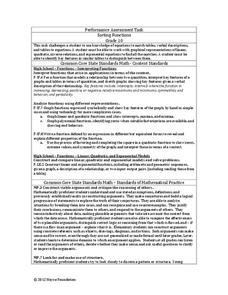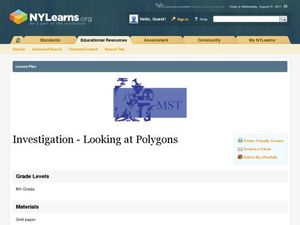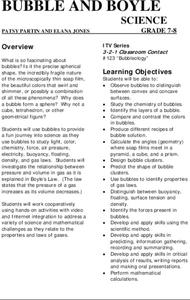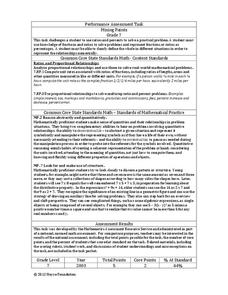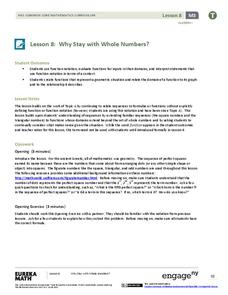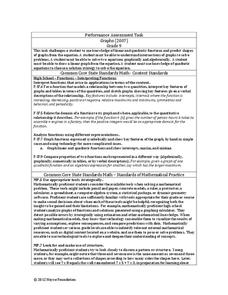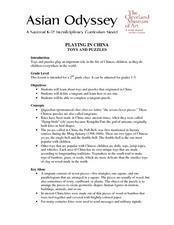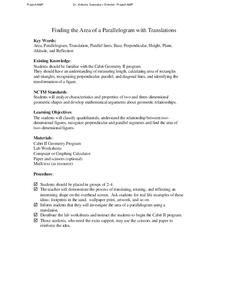Inside Mathematics
Squares and Circles
It's all about lines when going around. Pupils graph the relationship between the length of a side of a square and its perimeter. Class members explain the origin in context of the side length and perimeter. They compare the graph to the...
Inside Mathematics
Sorting Functions
Graph A goes with equation C, but table B. The short assessment task requires class members to match graphs with their corresponding tables, equations, and verbalized rules. Pupils then provide explanations on the process they used to...
Willow Tree
Angle Sum Property of Triangles
All triangles have some things in common. Using these properties of triangles, learners find missing angle measures. Scholars use the Angle Sum Property and properties of special triangles throughout the lesson.
NY Learns
Investigation - Looking at Polygons
Middle schoolers construct polygons by plotting points on a coordinate plane. Pupils connect the points and identify which polygons they have drawn. They will need graph paper to carry out the assigned activities. A vocabulary list,...
Shodor Education Foundation
Triangle Area
While the lesson focuses on right triangles, this activity offers a great way to practice the area of all triangles through an interactive webpage. The activity begins with the class taking a square paper and cutting in in half; can they...
Curated OER
Bubble and Boyle
Middle-schoolers still enjoy playing with bubbles! In this series of eight laboratory activities, science learners explore convex and concave surfaces, angles, gas laws, buoyancy, density and more!
Noyce Foundation
Granny’s Balloon Trip
Take flight with a fun activity focused on graphing data on a coordinate plane. As learners study the data for Granny's hot-air balloon trip, including the time of day and the distance of the balloon from the ground, they practice...
Inside Mathematics
Graphs (2006)
When told to describe a line, do your pupils list its color, length, and which side is high or low? Use a worksheet that engages scholars to properly label line graphs. It then requests two applied reasoning answers.
Noyce Foundation
Mixing Paints
Let's paint the town equal parts yellow and violet, or simply brown. Pupils calculate the amount of blue and red paint needed to make six quarts of brown paint. Individuals then explain how they determined the percentage of the brown...
Inside Mathematics
Snakes
Get a line on the snakes. The assessment task requires the class to determine the species of unknown snakes based upon collected data. Individuals analyze two scatter plots and determine the most likely species for five additional data...
Inside Mathematics
Two Solutions
Many problems in life have more than one possible solution, and the same is true for advanced mathematics. Scholars solve seven problems that all have at least two solutions. Then three higher-level thinking questions challenge them to...
Noyce Foundation
Boxes
Teach your class to think outside the box. Scholars use the concept of equality to solve a problem in the assessment task. They determine how to use a scale to identify the one box out of a set of nine boxes that is heavier than the others.
Inside Mathematics
Population
Population density, it is not all that it is plotted to be. Pupils analyze a scatter plot of population versus area for some of the states in the US. The class members respond to eight questions about the graph, specific points and...
EngageNY
Why Stay with Whole Numbers?
Domain can be a tricky topic, especially when you relate it to context, but here is a lesson that provides concrete examples of discrete situations and those that are continuous. It also addresses where the input values should begin and...
Inside Mathematics
Graphs (2007)
Challenge the class to utilize their knowledge of linear and quadratic functions to determine the intersection of the parent quadratic graph and linear proportional graphs. Using the pattern for the solutions, individuals develop a...
American Museum of Natural History
Piecing It All Together
Archaeology digs are much like giant jigsaw puzzles. The artifacts found are often in pieces and scientists must reconstruct them. A hands-on activity lets young archaeologists experience this facet of the job as they create, smash, and...
Curated OER
Playing in China
Students create their own Chinese tangrams using in-class direction and prior knowledge in this two-day lesson for the early elementary classroom. Chinese toys are also explored.
Curated OER
Chinese Puzzle Story
Students study the Chinese form of tangrams. They read the story, "Grandfather Tang's Story," by Ann Tompert and discuss how tangrams are used to tell the story. Using paper and scissors, they create animal tangrams and write stories...
Curated OER
Technology Integrated Lesson
Students investigate symmetry in the real world. In this geometry lesson, students inter-relate math and technology. They create and name a variety of polygons.
Curated OER
Probability and Geometry Problems
In this online math worksheet, students consider a variety of scenarios which include elements of geometry and probability. This excellent resource allows the students to check their answers, and to get "hints" should they run into...
Curated OER
Pythagorean Theorem
Students investigate the Pythagorean Theorem. In this seventh through twelfth grade geometery lesson plan, students explore the Pythagorean Theorem and its converse and use it to find the length of the missing side of a right triangle.
Curated OER
Finding the Area of a Parallelogram with Translations
Students calculate the area of a parallelogram. For this geometry lesson, students perform translation using a coordinate plane and coordinate pairs. They perform translation on other polygons.
Curated OER
Finding the Area of a Parallelogram with Translations
Students calculate the area of parallelograms. In this geometry instructional activity, students identify properties of parallelograms and use to to solve problems. They create polygons using Cabri software.
Curated OER
Investigating Nets and Polyhedra
Fifth graders create a net for a given polyhedron. They determine the corresponding polyhedron for a given net. Students investigate several polyhedra (cube, tetrahedron, and one of their choosing) and their corresponding nets. They...



